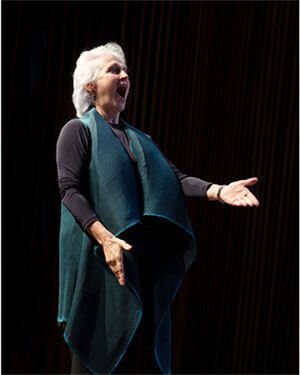
Elevating the Global Appreciation of Choral Music through Passion, Creativity, and Leadership
María Guinand joins Seraphic Fire in March 2023 to guest conduct Sacred | Profane, a program that weaves together choral works from Spain and Latin America with J.S. Bach's Jesu, Meine Freude.
“Maestra Guinand has been a champion for music writ large in South America, and she has brought that passion to her work in the US. She is absolutely the #1 person for this repertoire, and we wanted the best.” —Patrick Dupre Quigley, Artistic Director, Seraphic Fire
Born in Venezuela, María Guinand is an internationally renowned choral conductor, having toured globally and received choral conducting awards too numerous to list all but three of the most distinguished: the Helmuth Rilling Preis (2009), the Robert Edler Preis fur Chormusic (2000), and the Kulturpreis of the InterNationes Foundation (1998). She is internationally recognized as an authentic interpreter and trainer of Latin American choral music of the 20th and 21st centuries and is equally captivated by the performance of new music. Guinand shares her talents not only as a choral director and leader of national and international choral projects but as a college professor and teacher. She has been diligent in her efforts to permanently establish choral music centers for youth of disadvantaged backgrounds in Venezuela and other Andean countries.
In the following interview, Maestra Guinand provides insights into the development of this Seraphic Fire program and her expectations for the performance:
Q: The program that you are conducting is labeled sacred AND profane. Was it a challenge to choose diametrically opposed repertoire?
A: I like my programs to be a little wider in scope because I think this is the way life is today. I don't think we live in small holes. Actually, Patrick had asked me first for a different type of program. I sent him a program mainly on literature, sacred and profane, but from Spanish and Hispano-American sources. And later, I sent him a program on Bach and other composers with a more formal program.
I had Bach at the center because this is a year where we are commemorating Bach’s arrival to Leipzig; 200 years. And Patrick wrote to me, and said, “Do you think it would be crazy to combine these two programs? Not the sacred part of the Spanish, but instead do Jesu, meine Freunde as a sacred part of the program?” I said, “Why should this be crazy? We live in the same world. It's not that this music belongs to a different stratosphere.” It’s a program I really like, and I like the challenge.
Q: Can you describe the music that you have selected for the Sacred | Profane program?
A: I divided the program into four sections. I have one section which is devoted to the sea, Al Mar. I have composers from Spain and Venezuela: one is [Catalan composer] Mateo Flecha, and then there are three composers from the Madrigal School of Venezuela. Stylistically speaking, this music is very diverse. They write in very different ways and relate to music and text in very different ways.
Next, we will sing Jesu, meine Freunde. And then, we go to a third section, Al Amor, where I have music from the 16th century, from the 20th century, from a Spanish composer, and from Alberto Grau in Venezuela. There is also some music that comes from popular origins. And then the fourth section focuses on humor. Again, music from the Spanish and then two songs that are really popular songs from Latin America: Guararé, which is a very funny and witty song from Panama, and El Guayaboso, which is also wonderful and from Cuba. So, Bach will be beside all these composers, and I love that.
Q: When Patrick reached out to you about conducting for Seraphic Fire, were you familiar with the ensemble?
A: What brought Patrick and I together was Hildegard von Bingen. Patrick did a recording, and I also did this 20 years ago. When he spoke to me, he said that he had always been an admirer of the work I have done. So I think it was really beautiful to come together around a composer that lived 900 years ago in Germany, and we are here in the Americas.
I have been in Miami many times, conducting choirs and working also in FIU for several months helping the choral movement to grow; but Seraphic Fire, it's different. It's an ensemble, and one so experienced and professional. That is really challenging. So, what I'm looking forward to is seeing how we can work on this program together in a way that the singers understand the music, the language, the styles, and enjoy music that they may not normally do. We will have possibilities to play around with the music and to play with the audience through the music; to be not singing only from the score, but to be somehow interacting and creating different atmospheres.
Q: As guest conductor, what are some special qualities that you hope to share with Seraphic Fire and the audience?
A: Sometimes there is a big line between the Hispanic cultural background and German English cultural background. There seems to be a wide gap of understanding both culturally and in music, and I think that Patrick’s vision was that I could bring something that could really draw together these two worlds.
You know they call Miami the second capital of Latin America. So, this is a program to be sung in a place like Florida, like Miami. In my country and my culture, we don't have major differences between academic music and popular music. And you will see that in some of the Spanish songs, for instance, the first one that we open with Mateo Flecha, La Bomba.
I was reading some notes of a very interesting musicologist of the 17th century, and he said, ‘in the salad, you throw many herbs and different meats and fishes, olives, and vegetables. And because of that diversity, you make a plate.’ Then he says the composers in the time of Mateo Flecha were attached to the formality of the music of Palestrina and Tomás de Victoria. That was music in Latin, written in the motet style, very formal. With a ‘salad,’ they open a new window. They take some songs—popular songs—and they mix languages; some parts of the text are in Spanish and some are in Latin, but the text has a story. There are also different kinds of textures: homophonic and polyphonic. Audiences today are open to receiving programs that are colorful, creative, and changeable. This is why I'm really happy about this choice of this program.
Q: What do you expect the audience to take away from Seraphic Fire’s Sacred | Profane performance?
A: I think in the world today, choral music is an art that can bring not only beauty through music and singing, but also creativity, joy, and openness. It can build bridges, which we need very much to build bridges between cultures and human beings to keep living on this planet in the best possible way. And I think also Miami is a place of encounter between various cultures that allows many people coming from different places to feel represented somehow; to feel that they have a voice also in the program. So, this is very important for me.
See María Guinand lead Seraphic Fire in Sacred | Profane March 22-26, 2023. Tickets available now.



